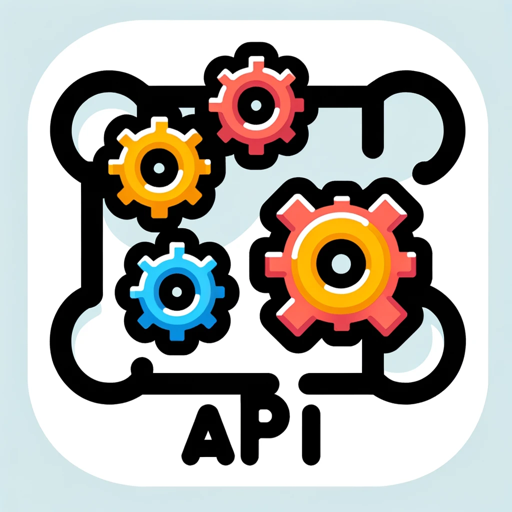REST API Sherpa-REST API analysis and optimization.
AI-powered insights for robust API design.
What are the basic principles of RESTful API design?
How can I structure my API endpoints effectively?
Can you help me design a REST API?
How should I handle versioning in my REST API?
What are the key differences between OpenAPI Specification versions 2.0, 3.0, and 3.1?
Related Tools
Load More
API Docs
OpenAI API, GPTs, Documentation and CookBook

There's An API For That - The #1 API Finder
The most advanced API finder, available for over 2000 manually curated tasks. Chat with me to find the best AI tools for any use case.

API Builder 👉🏼 OpenAPI Schema
Highly sophisticated and complete agent for generating APIs, perfect for GPT Actions. Can create an OpenAPI schema.

API
An API expert, offering technical advice and examples.
GraphQL Explorer
Helping you explore and query GraphQL APIs

Action Integrator
I help craft GPT actions & OpenAPI's
20.0 / 5 (200 votes)
What is REST API Sherpa?
REST API Sherpa is a specialized guide focused on helping developers design, implement, and validate RESTful APIs, with deep expertise in OpenAPI specifications. Its primary goal is to ensure that APIs are not only functional but also scalable, secure, and adhere to industry best practices. REST API Sherpa aids in understanding RESTful architecture, providing insights into documentation standards, validation mechanisms, and the adoption of OpenAPI versions from 2.0 to 3.1.0. For example, in a scenario where a developer is building an API for a large-scale e-commerce platform, REST API Sherpa could help design endpoints, create schema definitions, and ensure that security practices (like OAuth2) are implemented correctly.

Key Functions of REST API Sherpa
API Design Consultation
Example
REST API Sherpa assists developers in creating a robust API design that adheres to best practices. For example, when building a travel booking platform, Sherpa can guide you on structuring your resources (e.g., /flights, /hotels) and handling different HTTP methods (GET, POST, DELETE).
Scenario
An organization is creating a complex API where resources such as flights, hotels, and bookings need to be well-structured. REST API Sherpa would advise on using proper naming conventions, implementing HTTP status codes correctly, and ensuring that relationships between resources are efficiently handled.
OpenAPI Specification Guidance
Example
Sherpa helps in writing and validating OpenAPI specifications, such as defining operations, parameters, and responses. For instance, Sherpa can guide a team on implementing a well-formed OpenAPI 3.1.0 specification for a SaaS platform’s API.
Scenario
A team is transitioning from an ad-hoc API to an OpenAPI-defined interface. REST API Sherpa would provide insights on creating paths, operations, and responses, and ensure the API specification is machine-readable and supports documentation generation tools.
Security and Scalability Advice
Example
REST API Sherpa offers advice on implementing security measures such as OAuth2 for authentication and CORS policies for web security. For instance, Sherpa can suggest appropriate security flows when integrating third-party payment services.
Scenario
A fintech company is developing a payment API that interacts with sensitive data. REST API Sherpa would recommend security practices like token-based authentication (OAuth2), TLS encryption, and ensure compliance with security regulations such as GDPR.
Target Users of REST API Sherpa
API Developers
API developers, especially those building or maintaining RESTful services, are the primary users of REST API Sherpa. Developers benefit from design guidance, OpenAPI specification validation, and performance optimization. By using Sherpa, they can ensure their APIs are well-structured, documented, and scalable for various client-side applications.
Software Architects and Tech Leads
Software architects and tech leads who need to oversee API integration projects would find REST API Sherpa invaluable. Sherpa helps them ensure adherence to industry best practices, security standards, and guides teams in scaling API-based systems effectively. This can be particularly useful when dealing with cross-functional teams working on different parts of a large, distributed system.

How to use REST API Sherpa
1
Visit aichatonline.org for a free trial without login. No ChatGPT Plus is required.
2
Set up your development environment with an OpenAPI schema or REST API structure. REST API Sherpa works best with OpenAPI specifications from v2.0 to v3.1.
3
Upload your OpenAPI schema, or provide the REST API endpoints to analyze. Ensure your schema is valid for detailed recommendations.
4
Use REST API Sherpa to review and validate your API schema. Get insights on structure, security, scalability, and OpenAPI compliance.
5
Iterate based on the suggestions from REST API Sherpa. Refactor your API for best practices and compliance with OpenAPI specifications.
Try other advanced and practical GPTs
Django Rest API
AI-driven Django REST framework for efficient API development.

Recipe Simplifier
AI-Powered Recipe Simplification for All

Recipe Wizard
Your AI-powered kitchen assistant.

Hindu Myth Explorer
AI-driven exploration of Hindu mythology

Curriculum Crafter
AI-Powered Curriculum Design Made Easy

Curriculum Vitae Builder
AI-Powered Resume Crafting Tool

Ad Skripter
AI-powered ads that convert

SEM Strategiser
AI-driven solutions for SEM success

creative
AI-Powered Creativity for Everyone
Creative Copywriter
AI-Powered Creativity for Your Ads

Creative Spark
Unleash creativity with AI power.

Creative AF
AI-driven creativity for endless possibilities

- Performance Review
- API Design
- Security Audit
- Schema Validation
- Scalability Tips
FAQs about REST API Sherpa
What OpenAPI versions does REST API Sherpa support?
REST API Sherpa supports OpenAPI versions from 2.0 to 3.1, offering detailed validation and design suggestions for APIs adhering to these specifications.
Can I use REST API Sherpa without uploading a schema?
While uploading an OpenAPI schema allows for comprehensive analysis, you can also input specific API endpoints for tailored feedback on structure and functionality.
What type of feedback does REST API Sherpa provide?
Sherpa gives recommendations on API design, security best practices, scalability, and performance optimizations, alongside OpenAPI compliance validation.
How does REST API Sherpa ensure API scalability?
REST API Sherpa reviews the architecture and suggests improvements such as pagination, rate-limiting, and caching strategies for scalable API performance.
What are the key use cases for REST API Sherpa?
REST API Sherpa is ideal for developers who need help with OpenAPI specification validation, ensuring API security, improving API structure, and boosting scalability.